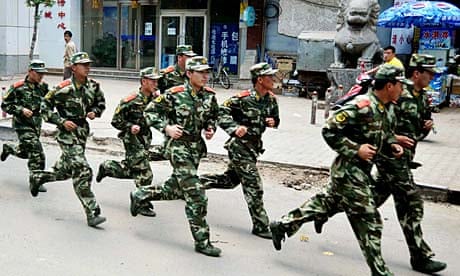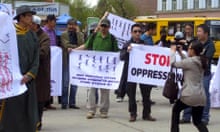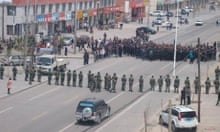A communist official tipped as a future leader of China is moving to defuse a wave of protests in Inner Mongolia by choking information, tightening campus controls and promising to reform the mining industry.
A demonstration by ethnic Mongolians on Monday in the regional capital, Hohhot, was the latest test for Hu Chunhua, whose appointment as party chief of the resource-rich region last year was widely seen as a step towards top office in 2020.
Censors have blocked information about the biggest surge of unrest that the northern region has experienced in 20 years, with witnesses and rights groups claiming to have seen rallies in at least six communities over the past week.
The protests were sparked by the killing of a Mongolian herder who tried to stop a convoy of coal trucks from trespassing on the grasslands. The case has become a symbol of unease about economic development that is marginalising ethnic rights and the steppe environment.
Locals told the Guardian the latest protests took place on Mondayin Hohhot despite tightened security. "It was about 20 Mongolians in Xinhua Square," said a blogger, who goes under the name Blue Sky Pigeon. "But I doubt it will last long because the controls are tight."
An employee at a hotel on the square confirmed a demonstration was taking place, but it was unclear how the security forces responded. The local police, government and propaganda offices either refused to comment or let phones ring unanswered, but the authorities have been working for several days to quash dissent with a mix of restrictions and conciliatory gestures.
After 1,000 students took to the streets in Xilinhot last Wednesday, paramilitary police are reportedly stationed at the gates of Inner Mongolia University in Hohhot and checking the identities and intentions of everyone going in and out. In other areas, schools associated with both Mongolian and Han ethnic groups have been subject to restrictions.
The Youth League Committee of Inner Mongolia University declined to discuss the new security measures, but acknowledged the students' online bulletin board and chatroom – known as Qizhi – had been shut down for "maintenance" until 10 June. Other reports suggest popular social networking sites such as QQ, Weibo and Tencent have been either blocked or heavily censored. A Chinese language internet search for "Inner Mongolia" and "protest" yielded no mention of the events of the past week.
Hotels near universities and schools have been forbidden from accepting foreign guests since last Friday. "The security has become tougher," said a taxi driver in Xilinhot, the site of an earlier disturbance.
Hu – a protege of president Hu Jintao (though no relation) – has tried to pacify the protesters with a promise of justice for the perpetrators of the killing of the herder – known as Mergen – on 11 June, and another death related to a coalmine protest four days later.
Recent incidents "have triggered a great deal of public anger", Hu told teachers and students last week, according to the Inner Mongolian Daily. "We will firmly protect the dignity of law and the rights of the victims and their families."
Local TV stations, which are controlled by the communist party, have shown Hu's deputy visiting Mergen's family to present a bundle of money. The chairman of the coal trucking company Liaoning Chuncheng Industry has also made a public apology. Police have arrested four people.
The official Xinhua News Agency said regional authorities would investigate the mining industry's impact on the environment and traditional livelihoods with the aim of improving the protection of grasslands. But many locals remain suspicious. Mongolian independence activists said concilliatory words could not disguise the long-term trends of resource exploitation that prompted the fatal clash between truckers and herders.
"Mongols have good reasons to doubt the intentions of the government. For the past six decades, the destruction of the grassland ecology, cultural assimilation, political oppression and economic exploitation have characterised the policies of the Chinese government in southern Mongolia," said a group calling itself the "Co-ordinating Committee for May 29/30 Protest".
If the protests continue, "Little Hu" (as the Inner Mongolian governor is nicknamed) may rely more on coercion and intimidation to impose order on a restless ethnic minority. There are precedents, including the crackdown imposed in Tibet by the current president Hu Jintao in the 1980s.
Recent mobile phone messages from the Inner Mongolian authorities have warned that the police are ready to "intensify the crackdown", according to Reuters. Amnesty International has urged restraint and called on the authorities to "respect freedom of expression and assembly for protesters".
Monday's relatively small demonstration, however, suggests Hu's efforts to silence, intimidate and buy-off critics may be working.


